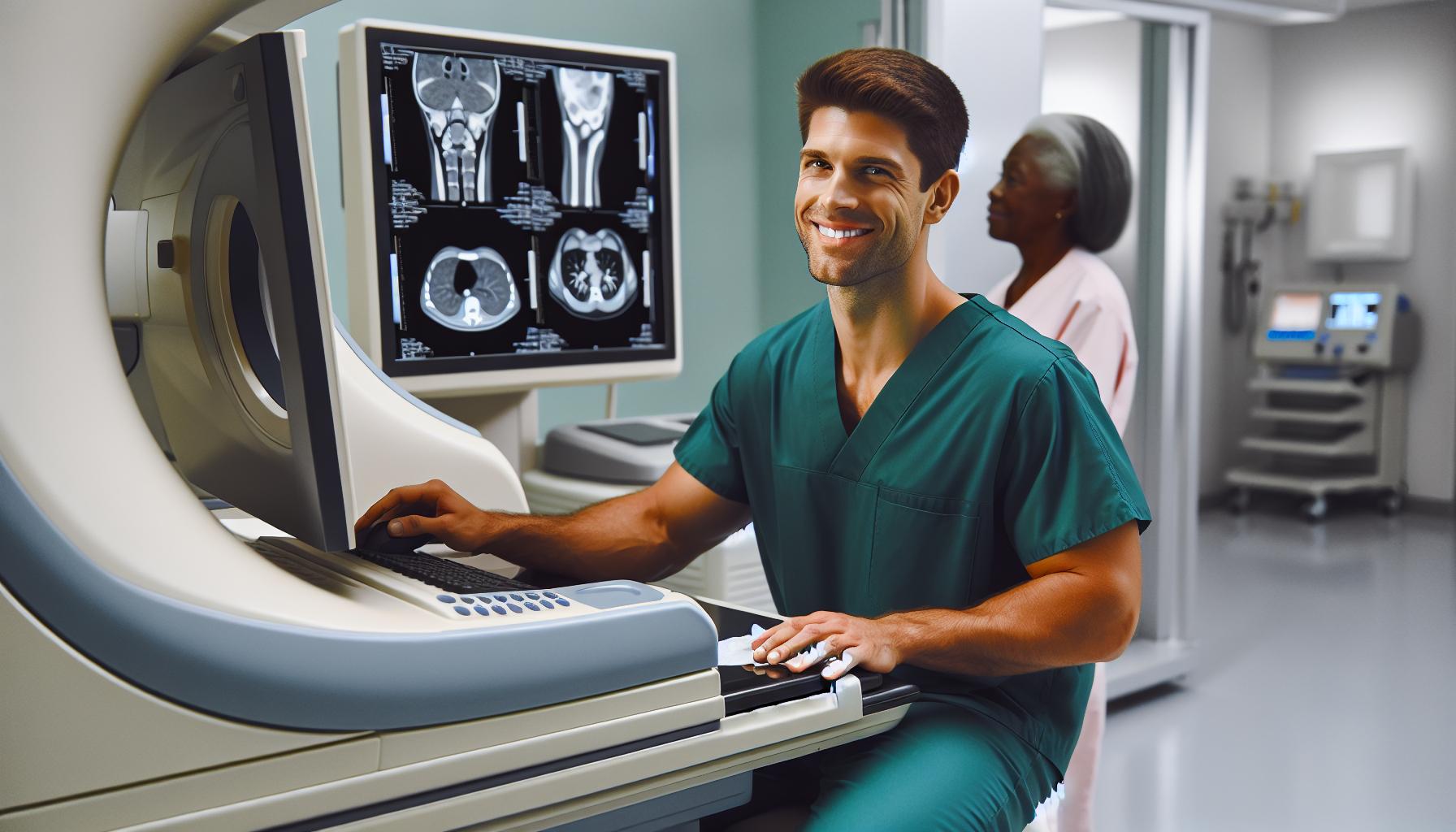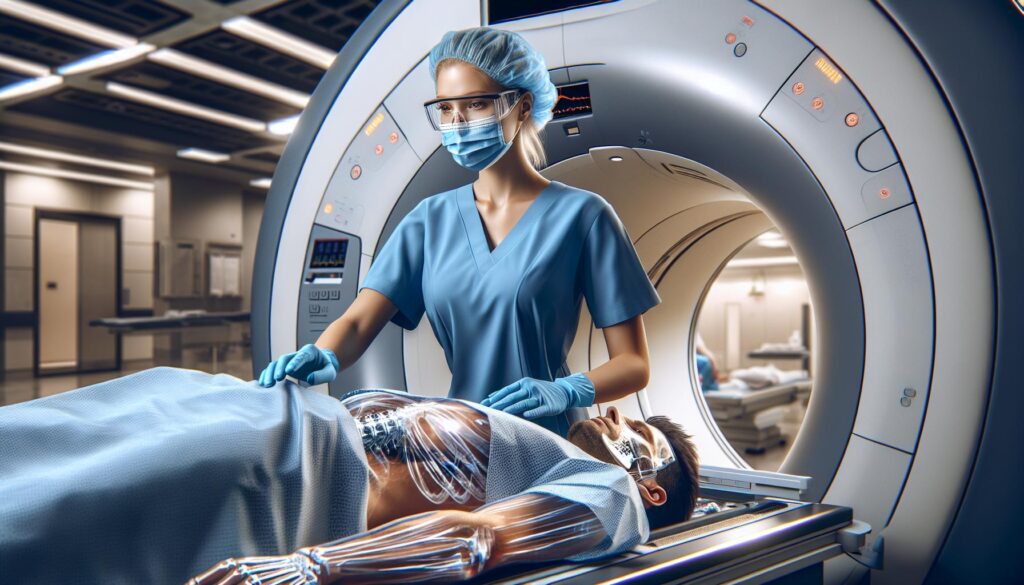Radiologic technologists play a vital role in healthcare by capturing medical images that help diagnose and treat patients. As the demand for medical imaging continues to grow these skilled professionals find themselves in an increasingly rewarding career field. The salary of a rad tech can vary significantly based on factors like location experience and specialization. While entry-level positions offer competitive compensation experienced rad techs working in specialized areas or major metropolitan centers can earn substantially more. With the healthcare industry’s steady expansion and technological advancements rad techs have numerous opportunities to increase their earning potential through additional certifications and specializations.
What is A Rad Tech Salary
Radiologic technologists operate specialized imaging equipment to create diagnostic images for patient care. Their primary responsibilities include:
- Prepare patients for imaging procedures by explaining processes
- Position patients correctly to capture accurate diagnostic images
- Operate X-ray machines MRI CT scan equipment
- Maintain radiation safety protocols for patients staff
- Process digital images for physician review
- Document patient information imaging results
- Collaborate with radiologists healthcare teams
A rad tech’s daily tasks extend beyond image capture to include:
- Quality control testing of imaging equipment
- Equipment maintenance monitoring
- Patient care coordination with medical staff
- Radiation exposure tracking documentation
- Implementation of safety procedures protocols
- Digital image archiving management
- Healthcare record system updates
The technical aspects of their role involve:
- Operating digital radiography systems
- Adjusting imaging parameters exposure settings
- Implementing radiation protection measures
- Performing diagnostic imaging procedures
- Managing image processing software
- Conducting equipment calibration checks
- Following ALARA radiation safety principles
| Key Responsibility Area | Percentage of Daily Work |
|---|---|
| Patient Imaging | 45% |
| Equipment Operation | 25% |
| Documentation | 15% |
| Safety Protocols | 10% |
| Quality Control | 5% |
- Hospital radiology departments
- Emergency care facilities
- Outpatient imaging centers
- Physician offices
- Mobile imaging units
- Surgical centers
- Urgent care clinics
Average Rad Tech Salary Overview

Radiologic technologists earn competitive salaries across the United States based on their experience level and location. The compensation structure varies significantly between entry-level positions and experienced roles.
Entry-Level Salary Range
Entry-level radiologic technologists earn an average base salary of $45,000 to $55,000 annually. Starting salaries in metropolitan areas like New York City, San Francisco and Boston reach $60,000, while rural locations offer $42,000 to $48,000. Additional compensation includes:
- Sign-on bonuses ranging from $2,000 to $5,000
- Shift differentials of $2-4 per hour for evening or weekend work
- Healthcare benefits valued at $8,000-$12,000 annually
- Retirement contributions matching up to 4% of salary
- Specialized certifications adding $5,000-$10,000 annually
- Leadership roles offering $75,000-$95,000 base pay
- Travel assignments paying $1,800-$2,500 weekly
- Performance bonuses of 3-5% annually
- Advanced modality expertise (CT, MRI) yielding $8,000-$15,000 more
| Experience Level | Base Salary Range | Additional Compensation |
|---|---|---|
| Entry-Level | $45,000-$55,000 | $10,000-$17,000 |
| Experienced | $65,000-$85,000 | $16,000-$30,000 |
| Specialized | $75,000-$95,000 | $20,000-$35,000 |
Factors Affecting Rad Tech Salaries
Radiologic technologist salaries vary based on multiple key factors that influence earning potential. Understanding these factors helps rad techs make informed career decisions and maximize their income opportunities.
Geographic Location Impact
Metropolitan areas offer higher rad tech salaries compared to rural locations due to increased cost of living and higher patient volumes. Cities like San Francisco, New York, and Boston provide average salaries 25-40% above the national median. State-specific data shows:
| State | Average Annual Salary |
|---|---|
| California | $87,500 |
| New York | $82,300 |
| Massachusetts | $80,900 |
| Mississippi | $52,400 |
| West Virginia | $54,100 |
Rural facilities often provide additional incentives like relocation bonuses or student loan repayment to attract qualified professionals.
Work Setting and Specialization
Different healthcare environments offer varying compensation levels for rad techs:
- Teaching hospitals provide 15-20% higher salaries plus research opportunities
- Outpatient imaging centers offer flexible schedules with competitive base pay
- Mobile imaging services pay premium rates plus travel allowances
- Veterans Affairs facilities include federal benefits packages
Specializations affect earning potential:
- MRI technologists earn 12% above base rad tech salaries
- CT specialists receive an 8-10% premium
- Mammography experts command 5-7% higher wages
- Nuclear medicine technologists earn 15-18% more than standard rad techs
- Cardiovascular interventional technologists receive 20% higher compensation
Each specialization requires additional certification through ARRT, increasing marketability and salary potential.
Benefits and Compensation Packages
Radiologic technologists receive comprehensive benefits packages that complement their base salaries. These packages vary by employer but typically include essential healthcare coverage extended retirement options.
Healthcare and Insurance Benefits
Most healthcare facilities provide rad techs with extensive insurance coverage including:
- Medical insurance with coverage for preventive care prescriptions diagnostic services
- Dental plans covering routine cleanings major procedures orthodontic care
- Vision insurance for annual eye exams contact lenses glasses
- Life insurance policies ranging from $50,000 to $100,000 in coverage
- Short-term disability insurance covering 60-70% of base salary
- Long-term disability protection after 90-180 days of disability
- Health Savings Accounts (HSA) with employer contributions up to $1,000 annually
- Paid vacation days starting at 10 days annually increasing with tenure
- Personal leave allocation of 2-5 days per year
- Sick leave accrual at 1 day per month
- 401(k) retirement plans with employer matching up to 6% of salary
- Pension plans in select healthcare institutions government facilities
- Educational reimbursement programs covering up to $5,000 annually
- Professional development funds for continuing education certifications
- Shift differential pay ranging from $2-$5 per hour for evening weekend shifts
| Benefit Type | Typical Coverage/Value |
|---|---|
| Medical Insurance | 80-90% employer-paid |
| Dental Coverage | 70-80% employer-paid |
| Vision Insurance | 50-60% employer-paid |
| 401(k) Match | Up to 6% of salary |
| Annual PTO | 10-25 days |
| Education Funds | $2,000-$5,000 |
Career Growth and Salary Advancement
Radiologic technologists access multiple pathways to increase their earning potential through professional development and career advancement opportunities. The field offers structured progression routes that combine additional qualifications with leadership roles.
Additional Certifications
Specialized certifications expand a rad tech’s expertise and earning capacity:
- Computed Tomography (CT) certification adds $5,000-$8,000 to annual base salary
- Magnetic Resonance Imaging (MRI) certification increases earnings by $7,000-$10,000 annually
- Mammography certification boosts income by $4,000-$7,000 per year
- Nuclear Medicine Technology certification elevates salary by $8,000-$12,000
- Cardiovascular-Interventional Technology certification raises pay by $6,000-$9,000
| Certification Type | Salary Increase Range |
|---|---|
| CT | $5,000-$8,000 |
| MRI | $7,000-$10,000 |
| Mammography | $4,000-$7,000 |
| Nuclear Medicine | $8,000-$12,000 |
| Cardiovascular | $6,000-$9,000 |
Leadership Opportunities
Management positions offer significant salary increases for rad techs:
- Lead Technologist roles command $75,000-$85,000 annually
- Radiology Department Supervisors earn $85,000-$95,000
- Imaging Directors receive $95,000-$120,000
- Clinical Education Coordinators make $70,000-$80,000
- Quality Assurance Managers obtain $80,000-$90,000
- Budget management responsibilities
- Staff scheduling oversight
- Equipment procurement authority
- Performance evaluation duties
- Regulatory compliance monitoring
Radiologic technology offers a promising career path with substantial earning potential. The combination of competitive base salaries generous benefits packages and numerous opportunities for advancement makes this field particularly attractive for healthcare professionals. A rad tech’s salary reflects their expertise specialization and location with experienced professionals earning well above the national average. Through continued education certifications and leadership roles rad techs can significantly boost their earning potential while contributing to essential healthcare services. For those considering this career path the financial rewards coupled with job security and growth opportunities make it a smart choice in today’s healthcare landscape.



